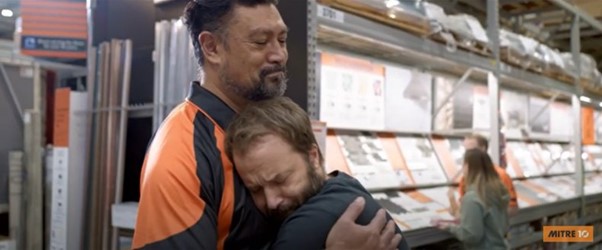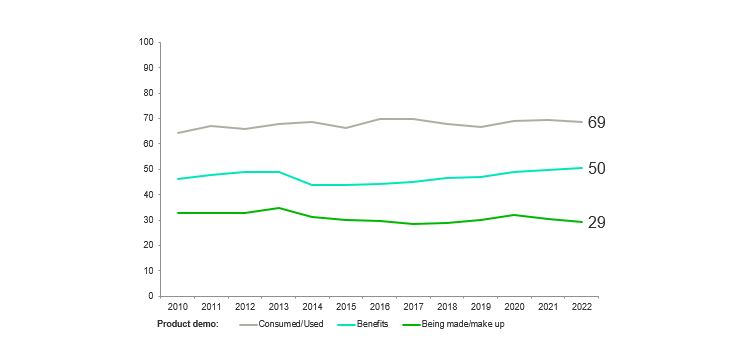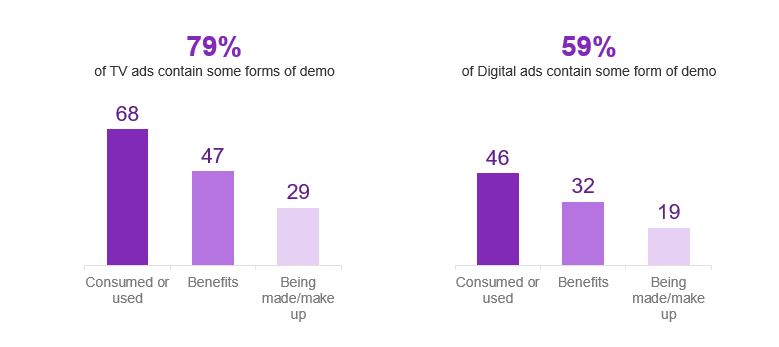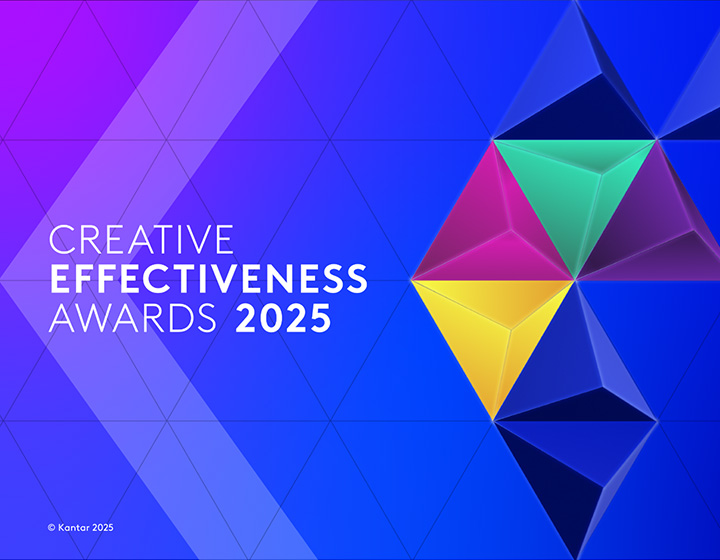With 75% of all ads in Kantar’s Link database containing some form of product demo, it’s not surprising that many of this year’s Kantar Creative Effectiveness Award winners feature them. But including a demo is not enough to make an ad great. It is the creative way in which demos are seamlessly ingrained into the story that makes these ads stand out.
Many of our winning ads across TV, digital and print/outdoor used a product demo to convey their brand message. eBay's winning digital ad finds a formulaic way to demonstrate their service by taking us on the rollercoaster of positive emotions that using their service can bring. Meanwhile, our TV winner for Mitre 10 is a fantastic example of an ad that demonstrates the benefits that the full brand experience can bring, through an emotional yet humorous story. Our top digital outdoor ad for the Google and Samsung collaboration is another successful example of a product demo, displaying in a few simple, sleek movements, how the folding feature of the Samsung phone supports and enhances the Google content.
Mitre 10, With You All The Way – TV winner, New Zealand

How to videos vs. product demos
It only takes a quick search to find a swathe of advice on how to make a product ‘how to’ video for social media. And there are more platforms available than ever before, and more start-ups creating their own advertising to demonstrate their products. The video clip has become a go-to way to learn whatever you need to do, deal with a plumbing crisis, fix a TV, or curl your hair, there are demo ‘how-to guides’ for everyone and everything. They are now the way many of us choose to learn, whether it’s a new hairstyle or how to change your vacuum cleaner bag. With this evolving help and support, the creative integration of a product demo into your brand’s advertising could become a very profitable move for brands.
Stay relevant and grab attention
Product demos in advertising, where the viewer is not searching ‘how to’ are very different.
People consume different media channels in very different ways, and content must work with the appropriate audience mindset to be effective. In advertising, you need to earn attention before bringing your product in. It must be relevant to the viewer for them to stay with it. We all remember ads that gained our attention and then immediately lost it with a product demo, but things have come a long way since then.
Our Kantar Creative Effectiveness Award winning ads this year showed a host of creative and new techniques to incorporate product demos into advertising in a seamless and smooth way. Even ads that on the surface tackled the product demo in a traditional way, such as our L'Oréal winner, found creative ways to do this. The success of this ad revolved around the cleverly entwined demo into the dynamic, action-styled, ‘mission’ of the ad, to hide the celebrity’s grey hair. The mission became a pivotal part of the story, ensuring a focus on the brand whilst at the same time entertaining and connecting on a humorously emotional level. The demo sequence also works for the brand by incorporating mnemonics; twist, shake, crack, apply, rinse, helping with long-term memory of the brand, its advertising, and the product.
The evolution of the product demo
There is nothing new about including product demos in ads. The level of use has remained consistent over the years. They have been a part of some of the most iconic ads ever created, such as Cadbury’s infamous Flake ad from the 80s showing a closeup of the product being consumed in a bath, or the equally well-remembered Shake n' Vac ad combining straightforward use of the product with a catchy tune, still remembered decades later.
The use of demos in advertising has stayed fairly constant over time

Demos are used more frequently in TV advertising than digital. However, the types of demos used are consistent across channels. The most popular is showing the product being used or consumed, followed by talking about its benefits. Showing how the product is made up is the least common demo form.
Product demos are used most often in TV ads

A further breakdown of digital advertising shows demos being used more frequently in YouTube ads 43% than on Instagram 35% and on Facebook where only 33% of ads contain product demos. It is possible that the ‘how-to’ nature of YouTube as a channel may have originally inspired the use of more demo ads on this platform.
What can demos do for you?
Product demos can be used in different ways to achieve a variety of outcomes. Done well, demonstrating the product benefits and what it is made from, can be a successful route to persuasion.
Communicating new information and relevance are also important persuasion factors. Our Link database of over 230k ads shows that ads demonstrating product benefits have a +17-point increase in communicating new information and +15 in relevance.
Showing how and what the product is made from can also help convey news with an average +13-point increase. This Grundig ad, a Kantar Creative Effectiveness Awards winner from 2021 is a great example; by explaining what the product was made from, they managed to convey the brand’s key ecological message. We also saw a +9-point increase in relevance when the ad demonstrated what the product was actually made from.
Overall, in terms of persuasion, ads where the consumer can see a product benefit show a +12-point increase. Those that show what the product is made from have an overall +10-point increase.
Building affinity
So, what else can the demo help with? We know that longer-term brand equity relies on the brand being meaningful to consumers, that is it meets their needs and that they feel affinity towards the brand. Our data shows that ads demonstrating the product being used or consumed have a +10-point increase in brand affinity where we ask consumers on a scale from love to hate, how they feel about the brand. And ads that demonstrate the benefits of the product see a +14-point increase in making the consumer feel the brand will meet their needs.
When incorporating the product demo, think about the type of demo that will best serve your objectives.
Getting the most out of your product demo
Regardless of what your brand is, a product demo can almost certainly help when used well. We’ve seen from the examples here that regardless of the category, there are ways to incorporate a demo. But it’s important to adapt your demos to fit with the channels your ads will appear on and the ever-changing nature of these. The growing opportunities of new and evolving channels mean keeping alert to new ways of showcasing your products and services in action. New visual and audio technologies are changing the creative possibilities of product demos. Consider how product demos might appear in gaming environments or virtual worlds, can they become part of the bigger experience as the metaverse develops? Heinz Cannes Lion winner this year creatively ventured into the gaming world, by integrating its product demo with a strong message ‘brands shouldn’t interrupt games’ showing an understanding of how and when their product is being used and demonstrating this in their advertising.
In categories such as beauty, fitness and fashion that lend themselves to showing the product in action influencers can be effective in building excitement by unboxing and demonstrating the product. They also tend to talk straight to camera building a personal and direct connection with their audience - a great environment for focussed attention on your brand. User-generated content can also be another great way to demo your brand. Tik Tok ads are well suited for this, matching the unique style, music and humour that are integral to this platform. Regardless of where your ads will appear, it is important to make the social media experience feel connected and coherent across all channels.
You can test your ads quickly and cost-effectively at any stage of development to make sure your product demos are hitting the mark. Check they are seamless and integrated and don’t ‘interrupt’ the creative flow of your ad. Ensure they convey the news and messaging you want to put across and help to make your brand relevant to your consumers and ultimately increase the persuasive power of your advertising. And check that in the longer term, your demo will make your brand more meaningful, building brand affinity and meeting the needs of your consumers.
We’d love to discuss how you can get the most out of product demos, so please get in touch to find out more.





